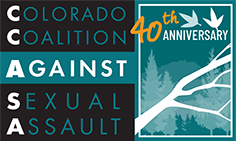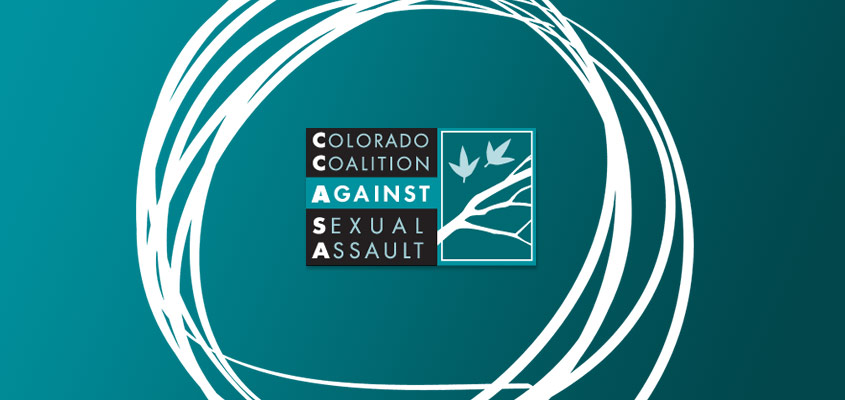By Michelle Schaunaman, CCASA Blogger
I read a thought provoking piece called, Not Every Rape Victim Needs to Be Emma Sulkowicz. It struck a chord with me, because in a previous role, I had prepared survivors to share their stories with the media.
This piece mentioned central issues with survivor interviews—how survivors are scrutinized, blamed, and sometimes dismissed by media and society alike. Further, how survivors are almost expected to publicly share their stories in order to educate the public.
According to this piece, focusing solely on individual survivors sharing their stories takes the onus off everyone else to do something about this issue and may potentially exploit the survivors themselves. This exploitation could mean issues with relationships and facing intense public opinions.
In my mind, as someone who’s worked with survivors and the media, I think what it all boils down to is choice and consent. The survivors should have the choice to tell (or not tell) their own stories and consent to sharing on their own terms.
Yes, journalistic integrity, sources, timelines, and whatnot have to be considered, but I think wherever possible survivors should be given choice. Parts of the interview like time, location, checking questions beforehand, and level of privacy should be chosen by survivors.
Sharing one’s story can be healing, if there is a positive reception. It doesn’t matter if it’s sharing with friends and family, an advocate, or the media— as long as it’s a positive response, sharing can be cathartic.
It’s on us as a society to respond positively and not drag people through the mud or make assumptions that one person’s story (positive or negative) is the collective narrative. Sexual assault is a far more complicated issue, comprised of many stories and experiences. We can’t lose sight of the individuals’ lived experiences, but we can look at individuals in a broader social context at the same time. We have to remember the ‘big picture.’
All of this aside, if you’re an advocate prepping a survivor for an interview (of her/his freewill) or you’re a survivor thinking about publicly sharing you story, here are a few things to consider:
- Are you (the survivor) ready for public scrutiny, for this story to ‘go viral,’ or for your anonymity to be exposed?
In this day and age, there’s no way to know that your information will be kept anonymous or private. Hopefully, whomever you are working with will take privacy seriously, but be prepared for someone to discover and expose your identity, even with your name changed, your voice altered, and your face blurred. If you decide to move forward, have a plan in place for loss on anonymity.
Be prepared for the story to possibly go viral—being shared by other media outlets—especially if you share your identity. Once it’s out in cyberspace, you no longer have control of the content. Are you okay with this?
I know this is controversial, but also consider if there has been a conviction in the case or not and weigh that consideration when sharing. The level of scrutiny may be amped up if there is not a conviction or the accused perpetrator may seek legal action. Are you ready to face these challenges?
- Do you have a support system, like an advocate, counselor, or family and friends, who will stand by you?
Sometimes survivors forget that friends and family or even co-workers could see the interview. Have you talked to those individuals first, or do you want them to know about your experience? Be prepared for their reactions, if you share.
(It’s very important, in my opinion, to have someone outside your family and friends who is on your side as well. Emotions can be heightened for friends or family members, and advocates or counselors can give you focused, non-judgmental support that secondary survivors may not be equipped to give due to your close relationship.)
If your story goes viral, you’re scrutinized or blamed, or your anonymity is compromised, do you have people who will support and affirm you, regardless of what happens or is said? If so, this is less likely to be a difficult or traumatic experience.
- Do you feel comfortable deflecting questions during the interview?
You don’t have to answer every question, but you should feel able to stick to your talking points and stand up for yourself when necessary, if a reporter is being pushy or rude to you. If this does not sound like you, you may want to reconsider the interview.
Hopefully, you will be working with someone (like an advocate), who will help vet the right person to interview you, set ground rules with the reporter, and jump in if necessary. Sometimes, viewing questions ahead of time or taking topics off the table is an option. You or your advocate can speak with the reporter about these ground rules. However, it’s still important to be prepared for difficult questions, if you choose to proceed without these ground rules or if boundaries are crossed.
You can say ‘no’ to an interview or stop the interview if your boundaries are being crossed. You should be given the choice to end the interview at any time and be given that choice up until the piece airs or is published. It’s okay to stand up for yourself and say what you want.
These questions may seem harsh, but it’s important for you to understand the reality of being interviewed and the possible outcomes. If you (the survivor) answered ‘yes’ to the questions above, then consider giving the interview. It’s ultimately your choice as the survivor to share or not share your experience.
If you need more help with interviewing, view my last blog post about preparing for a media interview. Many of those general tips will help you prepare, whether an advocate or survivor interviewing with the media.
As always, connect with CCASA or your local rape crisis center if you need assistance.
Image credit: http://i.guim.co.uk/static/w-620/h--/q-95/sys-images/Guardian/Pix/pictures/2014/12/8/1418009227548/202e0b93-7146-4d6a-9bfe-5a1e2baf0752-620x372.jpeg

